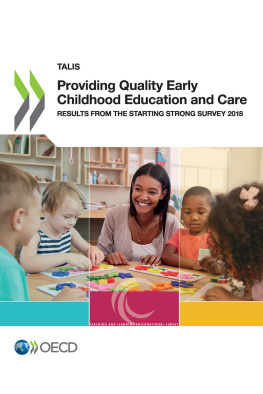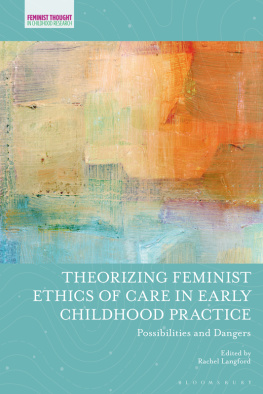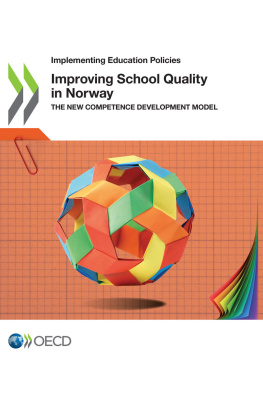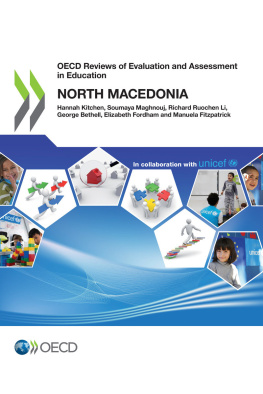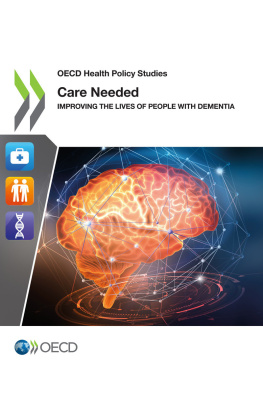OECD - Providing Quality Early Childhood Education and Care
Here you can read online OECD - Providing Quality Early Childhood Education and Care full text of the book (entire story) in english for free. Download pdf and epub, get meaning, cover and reviews about this ebook. year: 2019, publisher: OECD Publishing, genre: Children. Description of the work, (preface) as well as reviews are available. Best literature library LitArk.com created for fans of good reading and offers a wide selection of genres:
Romance novel
Science fiction
Adventure
Detective
Science
History
Home and family
Prose
Art
Politics
Computer
Non-fiction
Religion
Business
Children
Humor
Choose a favorite category and find really read worthwhile books. Enjoy immersion in the world of imagination, feel the emotions of the characters or learn something new for yourself, make an fascinating discovery.
Providing Quality Early Childhood Education and Care: summary, description and annotation
We offer to read an annotation, description, summary or preface (depends on what the author of the book "Providing Quality Early Childhood Education and Care" wrote himself). If you haven't found the necessary information about the book — write in the comments, we will try to find it.
OECD: author's other books
Who wrote Providing Quality Early Childhood Education and Care? Find out the surname, the name of the author of the book and a list of all author's works by series.
Providing Quality Early Childhood Education and Care — read online for free the complete book (whole text) full work
Below is the text of the book, divided by pages. System saving the place of the last page read, allows you to conveniently read the book "Providing Quality Early Childhood Education and Care" online for free, without having to search again every time where you left off. Put a bookmark, and you can go to the page where you finished reading at any time.
Font size:
Interval:
Bookmark:
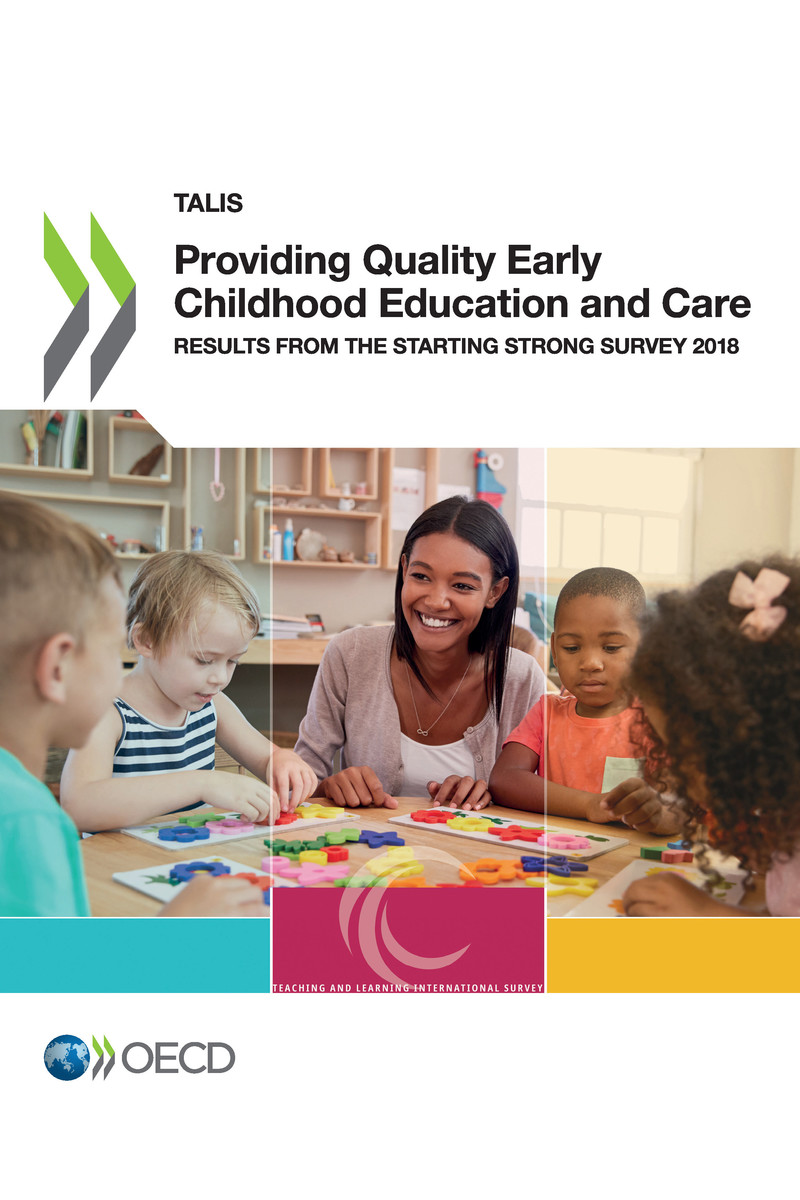
OECD (2019), Providing Quality Early Childhood Education and Care: Results from the Starting Strong Survey 2018 , TALIS, OECD Publishing, Paris, https://doi.org/10.1787/301005d1-en .
For many children, early childhood education and care (ECEC) is their first experience with other children and adults, away from their families. The promises of this experience are multiple. At this time of rapid brain development, children can play, learn new things and develop a range of skills and abilities. They can acquire a joy of learning, and they can make their first friends. Participation in ECEC also offers opportunities to detect and respond to childrens individual needs and to help all children to develop, building on their strengths.
Thanks to extensive research and studies, we know that high-quality ECEC can turn these promises into reality. Research shows that a major contributor to childrens learning, development and well-being is the quality of the interactions children experience daily with staff and other children in ECEC centres (these interactions are known as process aspects of quality). Research also identifies several factors that can influence the quality of these interactions, from ECEC staff and the extent to which they are educated, trained and motivated to work with children, to elements of the classroom/playroom environment, such as the number of children and staff and the mechanisms for monitoring ECEC settings (these factors are known as structural aspects of quality).
But while research suggests that the education we receive in early childhood matters most for our lives, ECEC is the sector of education we know least about. We take it for granted that all children attend school, and school is paid for by the public purse in virtually every OECD country. But in the first years of life, enrolment varies greatly across countries, and some countries ask the youngest children to pay the highest fees, while they make university tuition-free. We have a clear picture of what children learn in school, as well as who their teachers are, what they do, how they are paid, and how they were educated. In contrast, the provision of ECEC is often fragmented, poorly regulated and patchy.
That is the gap the OECD Starting Strong Teaching and Learning International Survey (TALIS Starting Strong) seeks to fill. It is the first international survey that focuses on the workforce in ECEC. It reveals key characteristics of the ECEC workforce, the practices they use with children, their beliefs about childrens development and their views on the profession and on the ECEC sector. TALIS Starting Strong was designed to approximate quality through questions to staff and leaders of ECEC centres on major elements that, according to research, influence childrens learning, development and well-being.
One of the most important findings is the relationship between pre-service and in-service education and training of staff, as well as their working conditions, and the practices staff use with children and parents. However, training specifically to work with children is not universal, and participation in professional development, while common, is not equal among staff. These findings point to the need for policies to better prepare and support staff in their daily activities and practices with children.
TALIS Starting Strong also shows great variation within countries in the factors related to the quality of interactions between staff and children. For instance, there are large variations within countries in the share of highly educated staff per centre. In centres with many children from socio-economically disadvantaged homes, enhanced services can help put all children on a level playing field, but few countries systematically provide such services. At the same time, there is little evidence that the allocation of human resources to ECEC centres increases inequalities between centres with different geographical locations and child characteristics.
Finally, TALIS Starting Strong asks staff and leaders a number of key questions to learn about the major difficulties they face in their jobs. Staff are asked about the barriers they face to participation in professional development and their priorities for spending reallocation, and leaders are asked about the barriers to their effectiveness. Both staff and leaders are asked about their sources of stress. Answers to these questions converge to highlight a number of bottlenecks in the ECEC sector. Some of these bottlenecks are common to all participating countries. This is the case for staff absences and staff shortages, which appear as barriers to leaders effectiveness and to staffs participation in professional development. According to staff, support to work with children with special needs appears as a top priority for both professional development and reallocation of spending. Reducing group size is another top priority for staff for reallocation of spending, while too many children in the group is a top source of stress. These findings point to the need for policy changes that governments are aware of, but such changes would involve trade-offs in situations of tight budget constraints. TALIS Starting Strong offers guidance that can help each participating country to identify priorities for policy change.
In all countries, people care about children, especially young children. However, in most countries participating in the Survey, staff do not feel highly valued by society. Why do those who devote their time to do the best for children not feel more highly valued? Attracting and retaining a high-quality workforce is a challenge for all participating countries.
In many countries, governments have done a lot to develop access to ECEC. But access is not enough; ECEC policies need to focus more on quality. TALIS Starting Strong reminds us that childrens early years are the foundation of their lives as students, adults and citizens. In the same way, it reminds us that ECEC policies need to be fully integrated with other policies that support economic growth and social inclusion. For childrens learning, development and well-being, every year counts.
Font size:
Interval:
Bookmark:
Similar books «Providing Quality Early Childhood Education and Care»
Look at similar books to Providing Quality Early Childhood Education and Care. We have selected literature similar in name and meaning in the hope of providing readers with more options to find new, interesting, not yet read works.
Discussion, reviews of the book Providing Quality Early Childhood Education and Care and just readers' own opinions. Leave your comments, write what you think about the work, its meaning or the main characters. Specify what exactly you liked and what you didn't like, and why you think so.

